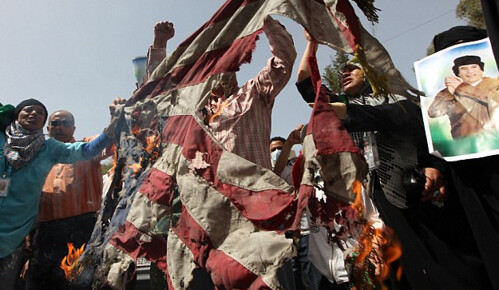
In the aftermath of the targeted assassination of the son and grandchildren of Libyan leader Muammar Gaddafi, people attacked the embassies of several western states on May 1, 2011., a photo by Pan-African News Wire File Photos on Flickr.
NATO attacks Gadhafi's TV broadcast capability
Alliance spokesman says three satellite transmission stations hit by airstrike
Col. Roland Lavoie of NATO said three satellite dishes were destroyed in an air strike. He said the attack was aimed at preventing Moammar Gadhafi's regime from broadcasting intimidating and oppressive messages that incite hatred and "mobilize its supporters against civilians."
Late Friday, several explosions rocked Tripoli, and Libyan state television said airstrikes had hit civilian targets.
The attack came as Libyan rebels said the gunmen who shot dead their military chief were members of an Islamist-linked militia that is allied to their struggle to overthrow Gadhafi.
The assassination of Abdel Fattah Younes, apparently by his own side, has hurt the opposition just as it was winning broader international recognition and launching an offensive in the west of the country.
It will deepen concerns among the rebels' Western backers including the United States, keen to see them prevail in a five-month-old civil war but frustrated by their lack of unity and nervous about the influence of Islamists.
After 24 hours of confusion, rebel minister Ali Tarhouni said Younes had been killed by members of the Obaida Ibn Jarrah Brigade, a militia allied to the rebels and named after one of the companions of the Prophet Mohammad, suggesting that Islamist elements were involved.
Tarhouni told reporters in Benghazi on Friday that a militia leader who had gone to fetch Younes from the front line had been arrested and had confessed that his subordinates had carried out the killing.
"It was not him. His lieutenants did it," Tarhouni said, adding that the killers were still at large.
Rebel leader Mustafa Abdel Jalil said on Thursday Younes had been recalled for questioning to Benghazi but was killed before he arrived. Relatives said they retrieved a burned and bullet-riddled body.
Calls for unity
Younes took part in the coup that brought Gaddafi to power in 1969 and served him for four decades. He quit as interior minister in February and defected to the side of the rebels, becoming their military chief.
Parts of the opposition distrusted him because of his long and close ties to Gaddafi.
One rebel commander, who asked not to be named, said Islamists whom Younes had targeted in his job as interior minister may have killed him in retaliation.
"Some of those Islamists are now fighting with the rebels and they have always refused to fight under Younes's command and have always viewed him with suspicion," he said.
"Abdel Jalil could not directly accuse the Islamists because he fears them. And I don't think the investigation will lead anywhere. They don't dare to touch the Islamists."
The government in Tripoli said al Qaeda was to blame.
Rebels who rose up against Gadhafi's 41-year rule in February have seized swathes of the country but remain poorly equipped and are still far from ousting him, despite support from NATO airstrikes.
The United States, which like some 30 other nations has formally recognised the opposition, said Younes's death was a blow but called for solidarity among the rebels.
"What's important is that they work both diligently and transparently to ensure the unity of the Libyan opposition," State Department spokesman Mark Toner said in Washington.
On Friday, weeping relatives and supporters brought Younes's coffin into the main square of Benghazi to mourn him, as fighters fired guns in the air.
Portugal's envoy to the United Nations said on Friday a Security Council panel was prepared to end months of deadlock and release Libyan assets frozen under U.N. sanctions, in order to buy humanitarian aid.
No comments:
Post a Comment